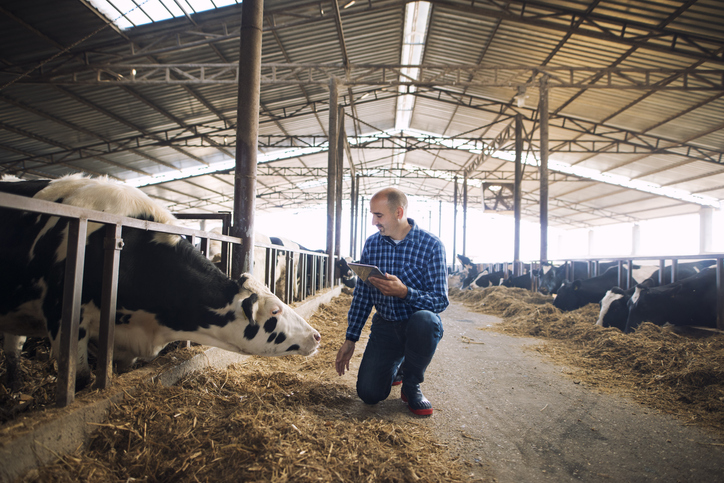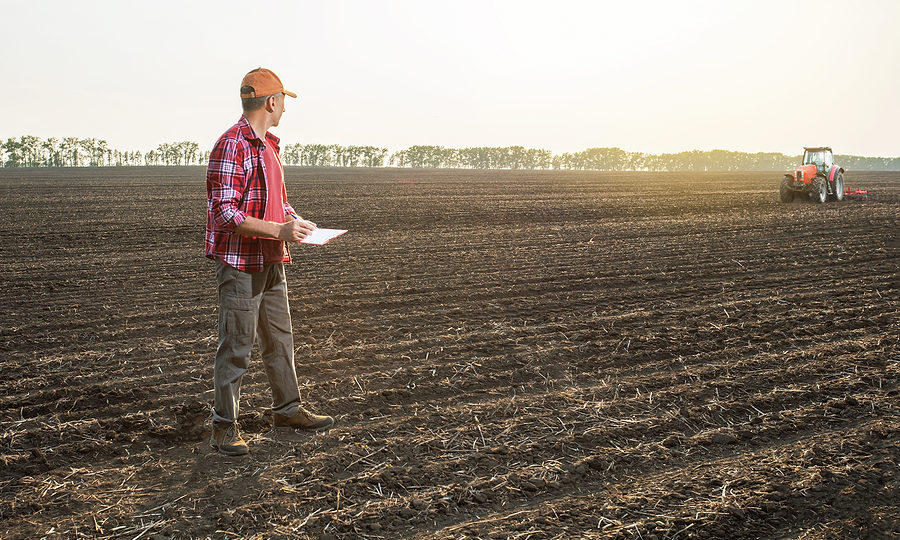-
Why Tax Planning for Farmers is Essential
- Aug 30, 2023
- By Genske, Mulder & Company
- In Uncategorized
- Comments Off on Why Tax Planning for Farmers is Essential
In the world of dairy farming, life revolves around the care of livestock, the cultivation of land, and the production of wholesome products. Farmers combat the variably changing milk and commodity markets to maintain profitability and a significant piece impacting a dairy farmer’s bottom line: tax planning. While cows graze and fields flourish, the savvy dairy farmer understands that proactive tax planning is essential for financial sustainability and growth. In this blog post, we delve into the reasons why tax planning holds a crucial place in the life of a dairy farmer.
1. Preserving Profitability
Tax planning isn’t just about reducing the tax bill but optimizing profits. By strategically managing deductions, credits, and expenses, dairy farmers can effectively lower their taxable income and retain a greater portion of their hard-earned revenue. This extra capital can be reinvested into the farm’s operations, enabling expansion, equipment upgrades, or herd improvements.
2. Navigating Agricultural Tax Complexities
The world of agriculture is filled with unique tax regulations and incentives that not all professionals may be familiar with. Dairy farmers face a complex web of deductions, exemptions, and credits tailored to their industry. Effective tax planning involves understanding these nuances and aligning financial strategies with them to maximize benefits.
3. Managing Cash Flow
Dairy farming often involves seasonal fluctuations in income and expenses. Proper tax planning can help even out cash flow by deferring income to lower-tax years or prepaying expenses to reduce taxable income in high-earning years. This approach can provide stability and improve the farm’s financial resilience.
4. Utilizing Deductions and Credits
Dairy farmers have access to a range of deductions and credits related to equipment purchases, animal care, conservation efforts, and more. By staying informed about these opportunities, farmers can take full advantage of them to reduce their tax liability and increase their overall financial efficiency.
5. Minimizing Surprises and Penalties
Failing to plan effectively can lead to unpleasant surprises during tax season. Unexpected tax bills or penalties can strain a dairy farmer’s financial resources. By engaging in year-round tax planning, farmers can accurately estimate their tax liability and make timely payments, avoiding costly penalties and ensuring compliance with tax regulations.
6. Family and Succession Planning
Many dairy farms are family-owned and operated. Proper tax planning can help facilitate smooth transitions of ownership from one generation to the next. Implementing strategies like gifting assets, utilizing family partnerships, and structuring estate plans can ensure the legacy of the farm while minimizing tax implications.
7. Investment in the Future
The dairy industry is evolving with advancements in technology and sustainable practices. Tax planning can facilitate the adoption of these innovations by providing tax incentives for investing in energy-efficient equipment, sustainable practices, and research and development.
In the world of dairy farming, where the connection to the land and animals runs deep, tax planning might seem like a distant concern. However, it is an integral part of securing the farm’s financial health and prosperity. By embracing strategic tax planning, dairy farmers can not only ensure compliance with tax laws but also harness opportunities to reduce tax burdens, increase profitability, and pave the way for a thriving and sustainable future in the industry. As the cows graze and the milk flows, effective tax planning stands as a testament to the farmer’s commitment to the farm’s growth and success.
Fortunately, our team of farm accountants at Genske, Mulder & Company, LLP can provide valuable guidance and expertise to help farmers create a comprehensive tax plan, ensuring they maximize their income and take full advantage of all available tax planning tools. Contact us today to learn more.
-
Farm Bookkeeping 101: Seven Steps to Ensure Success
- Aug 30, 2023
- By Genske, Mulder & Company
- In Uncategorized
- Comments Off on Farm Bookkeeping 101: Seven Steps to Ensure Success
In today’s economic landscape, proper bookkeeping practices are essential for any business, and farming is no exception. Farm bookkeeping helps farmers keep track of their financial activities and provides valuable insights for making informed decisions. It ensures that all financial transactions are recorded accurately, forming the foundation for analysis and decision-making. Proper bookkeeping practices offer several benefits, including:
1. Financial Control: Maintaining organized financial records allows farmers to closely monitor their income and expenses closely, enabling better control over their finances.
2. Profitability Analysis: Through regular review and analysis of financial reports, farmers can identify profit margins, assess the performance of different ventures, and make adjustments accordingly.
3. Tax Compliance: Accurate and up-to-date financial records facilitate tax preparation and promote adherence to tax regulations.
4. Access to Financing: When seeking loans or grants, comprehensive financial records are crucial for demonstrating the financial viability and stability of the farm operation.Understanding Farm Bookkeeping
Farm bookkeeping involves systematically recording, organizing, and analyzing financial data related to agricultural activities. It provides insights into the farm’s financial health and offers a clear picture of the profitability and costs associated with specific aspects of the operation. Key components of farm bookkeeping include:
• Income Records: Tracking all sources of income, such as crop sales, livestock sales, government subsidies, and other revenue streams.
• Expense Records: Logging all farm-related expenses, including feed, seed, fertilizers, equipment, labor costs, maintenance, and utilities.
• Inventory Management: Maintaining accurate inventory records, including livestock, crops in storage, and other farm assets.
• Bank Statements: Regularly reconciling bank statements with bookkeeping records to ensure accuracy.Step 1: Establishing a System
The first step toward better farm bookkeeping is establishing a system that aligns with your farm’s unique needs. Consider the following factors:
• Design: Design a bookkeeping system that suits your farm’s size, complexity, and available resources. Choose a user-friendly and efficient method, whether it’s a manual ledger, spreadsheet, or specialized software.
• Software or Tools: Select the right software or tools for farm bookkeeping. Numerous options, such as accounting software tailored for the agricultural sector, can simplify record-keeping and streamline financial management.Step 2: Organizing Financial Documents
Gathering and organizing all relevant financial documents is crucial to ensure efficient bookkeeping. This includes invoices, receipts, bank statements, loan documents, and other financial paperwork. Create a system, whether physical folders or software categories, to easily store and access these documents.
Step 3: Tracking Income and Expenses
Accurate tracking of income and expenses is the backbone of farm bookkeeping. Record all sources of income, including sales from crops, livestock, or other products, as well as any government subsidies or grants. Simultaneously, diligently monitor and log all farm-related expenses, such as feed, equipment purchases, fuel, maintenance, repairs, and labor costs.
Step 4: Maintaining Accurate Inventory Records
Managing inventory is a critical aspect of efficient farm bookkeeping. Properly tracking inventory helps identify the availability and value of assets, facilitates tax valuation, and enables effective decision-making. Implement manual or digital systems to record and update inventory levels regularly.
Step 5: Reconciling Bank Statements
To ensure the accuracy of your financial records, regularly reconcile your farm’s bank statements with your bookkeeping. This process involves comparing transactions from your bookkeeping system with bank statements, detecting discrepancies, and promptly addressing them. By doing so, you can catch errors or fraudulent activities and maintain the integrity of your financial records.
Step 6: Analyzing Financial Data
Financial data analysis offers valuable insights into the profitability of your farm operation. Utilize financial reports generated from your bookkeeping system to evaluate performance, identify areas for improvement, and seek cost-saving opportunities. Regularly reviewing and analyzing these reports will help inform decision-making and drive farm profitability.
Step 7: Budgeting and Financial Planning
Utilize historical farm bookkeeping data to develop a realistic budget for the upcoming year. A well-planned budget considers projected income, upcoming expenses, and investment needs. This exercise enables farmers to estimate cash flow, allocate resources effectively, and make informed financial decisions.
When to Seek Help from an Accounting Professional
Engaging an accounting professional may become necessary at a certain point. As your operation grows or becomes more complex, professional assistance can provide expert financial advice, ensure compliance with tax regulations, and optimize your bookkeeping system. Don’t worry – as one of the top CPA firms in the country, at Genske, Mulder & Company, LLP, and we’re here to help. Contact us today to learn more.
-
Financial Planning for Farmers for Maximizing Profits
- Aug 30, 2023
- By Genske, Mulder & Company
- In Uncategorized
- Comments Off on Financial Planning for Farmers for Maximizing Profits
By incorporating effective financial planning strategies, farmers can mitigate risks, avoid costly mistakes, and make their farms as profitable as possible. This article will explore the importance of financial planning for farmers and how it can contribute to their long-term success.
Understanding Cash Flow
A crucial component of financial planning for farmers is gaining a thorough understanding of cash flow. Since farming often requires significant capital investments, it is essential to evaluate the financing options available and assess the profitability of these investments. While high yields are desirable, excessive spending on inputs can erode profitability. Engaging a knowledgeable financial advisor can provide valuable insights by identifying areas of wasteful spending and finding viable sources of capital to drive sustainable growth without accumulating excessive debt. Moreover, financial advisors can analyze current cash flows and collaboratively develop plans to enhance profitability.
Optimizing Tax Planning
Farm taxes introduce an additional layer of complexity beyond regular business taxes. Farmers are entitled to numerous tax exemptions, deductions, and rebates designed for their industry. While farmers may already have accountants to handle their tax returns, partnering with a financial advisor can offer substantial benefits. Financial advisors specializing in agriculture can assist farmers in planning for lower tax burdens in the long run. They can guide eligible expenses, taxable income, and strategies to qualify for tax breaks. Additionally, financial advisors can help farmers choose the most suitable business structure based on the size and needs of their farm. By undertaking comprehensive tax planning at the beginning of each year, farmers can position themselves for success come tax time.
Breakeven Analysis
Breakeven analysis is an essential component of financial planning for farmers, allowing them to calculate the minimum price they need to sell their products to cover fixed and variable costs. Through breakeven analysis, farmers can determine their level of profitability, identify inefficiencies and waste, and make informed decisions regarding crop choice, pricing, and marketing. A financial advisor can guide farmers through performing a breakeven analysis, outlining areas that need improvement, and offering recommendations to enhance profitability. With the insights from breakeven analysis, farmers can develop an informed business plan and cultivate a profitable and sustainable agricultural enterprise.
Benchmarking
Benchmarking allows farmers to compare their financial performance to industry standards and top performers, providing insight into areas for improvement and where the farm excels. Farmers can identify opportunities for cost savings and optimization by analyzing data trends, allowing them to allocate resources and increase profitability efficiently. A financial advisor can assist farmers in identifying relevant benchmarking indicators, comparing their performance to peers, and recommending improvement strategies. With the guidance of a financial advisor, farmers can leverage benchmarking to increase profits, reduce costs, and position their farms for long-term success.
Financial Forecasts
Financial forecasting involves predicting future financial performance, helping farmers evaluate different scenarios’ impacts, and making informed decisions about their operations. Farmers can project future costs, revenues, and profits by examining financial statements and industry trends. Accurate financial forecasts enhance decision-making, allowing farmers to develop business plans, prepare for seasonal fluctuations, address challenges promptly, and identify areas for growth. A financial advisor can assist farmers in developing robust financial forecasts, leveraging their industry expertise to provide valuable insights and recommendations to optimize financial performance. By engaging the services of a financial advisor, farmers can create realistic financial goals and implement strategies to achieve them efficiently.
Finding the Best Farm Financial Planning Experts
When it comes to financial planning for farmers, the expertise of a specialized financial advisor is invaluable. While any financial advisor can be helpful for individuals managing personal budgets, farmers require advisors with specific knowledge and experience in the agricultural sector. Farmers can access tailored guidance and solutions that cater to their unique financial needs and circumstances by seeking out an advisor well-versed in assisting farm owners. Genske, Mulder & Company, LLP experts have over 40 years of experience helping farmers grow and thrive. Reach out to us, share your requirements, and let us connect you with the expert support you deserve.
-
Farm Inheritance Tax: Protecting Your Farm’s Legacy
- Aug 30, 2023
- By Genske, Mulder & Company
- In Uncategorized
- Comments Off on Farm Inheritance Tax: Protecting Your Farm’s Legacy
As a farmer, you understand the value of hard work and the importance of preserving your legacy for future generations. One crucial aspect of estate planning for farmers is managing inheritance taxes. In this article, we will explore the concept of farm inheritance tax, its implications, and essential strategies to minimize the tax burden on your heirs.
Understanding Farm Inheritance Tax
As of 2023, the federal estate tax applies to estates with over $ 12.92 million in assets. If your farm’s assets exceed these limits, your heirs may be required to file a federal estate tax return and pay up to a 40% tax on the amount exceeding the limit. However, it is essential to note most family farms fall below these thresholds.
Additionally, some states also have estate taxes. Seventeen states impose either an estate or inheritance tax. Some of these state exemption levels are as low as $1 million; in some situations, no exemptions apply.
Ways to Reduce Farm Inheritance Tax
Although avoiding inheritance taxes for your farm may not be possible altogether, there are strategies to minimize the tax burden. Here are a few effective methods:
1. Gifting Land and Assets: By giving gifts to your relatives, you can effectively reduce the value of your estate. As of the 2022 tax year, the maximum amount you can give to someone without it counting against your lifetime exclusion amount is $16,000. Gifting land within this limit to others can also help minimize tax implications.
2. Establishing Trusts: Properly structured irrevocable or bypass trusts provide legal protection for your farm assets. Trusts can offer flexibility and control over how your assets are distributed while helping to reduce inheritance taxes.
3. Strategic Spending: If your farm’s assets may surpass the federal or state exemption limits, consider spending surplus wealth now. By enjoying your extra wealth during your lifetime, you can reduce the value of your estate and minimize inheritance taxes for your heirs.
Importance of Farm Succession Planning
Creating a comprehensive farm succession plan is crucial to ensuring the smooth transition of your farm or ranch to the next generation. In addition to addressing legal and financial complexities, a well-designed succession plan can help your heirs minimize inheritance taxes.
Starting your Farm Estate Planning Journey
Navigating farm inheritance tax and estate planning can be overwhelming. Fortunately, you don’t have to do it alone. Begin by building a team of professionals who can guide you through the succession process and help create a customized strategy to ensure the longevity of your farm.
Farm inheritance tax is a significant concern for farmers who want to preserve their hard-earned legacy. By understanding the implications of estate taxes, exploring tax reduction strategies, and implementing a robust succession plan, you can contribute to the long-term sustainability of your farm and ensure a smooth transfer of assets to the next generation.
Our team of professionals at Genske, Mulder & Company, LLP is here to help you safeguard your farm’s future and protect your family’s legacy. Contact us today to learn more.
-
Do Farmers Pay Taxes? The Basic Tax Obligations of Farming
- Jul 10, 2023
- By Genske, Mulder & Company
- In Uncategorized
- Comments Off on Do Farmers Pay Taxes? The Basic Tax Obligations of Farming
If you raise crops or livestock for profit, and the money you make is more than just a side income, then IRS considers your farm to be a business. In this article, we’ll explore the various taxes farmers need to consider. By understanding these tax requirements, farmers can stay compliant with government regulations while optimizing their financial strategies.
Business Income Tax
One of the primary taxes that farmers must pay is the business income tax. Farm income is reported on the personal income tax return, and farmers must track their sales of livestock, produce, grains, and other products.
Employment Taxes
If farmers hire workers for their farming operations, they are responsible for paying employment taxes. These taxes include federal income tax withholdings, Social Security tax, Medicare tax, and possibly federal unemployment tax. Farmers must withhold and pay these taxes on behalf of their employees, along with their share of FICA taxes.
Sales Tax
In most states, a state sales tax applies to various transactions, including farming. While some farming income may be exempt from sales tax, farmers must know the specific rules and exemptions that apply to their state.
Property Tax
Business farm property is subject to property tax, including real property such as land and buildings and personal property used for farming operations. Farmers must account for property tax when planning their farm expenses and should consult their local tax authorities for specific rates and assessments.
Use Taxes
Use taxes are applicable when sales tax does not apply. This tax is levied on goods and taxable services purchased for use, storage, or consumption in the state. Farmers should be aware of these taxes, especially if they purchase equipment or supplies from out-of-state sellers who did not collect sales tax.
Gift Taxes
Farmers should also be aware of gift taxes if they transfer property to someone else while receiving nothing or less than its total value in return. While certain exemptions apply, farmers should consult the IRS guidelines and determine if they need to file a Gift Tax return.
Self-Employment Taxes
Since farmers are considered self-employed, they are responsible for paying self-employment taxes. This includes both the employer and employee shares of the tax. Farmers can deduct farm expenses to reduce their tax liability, which is especially beneficial during periods of low or no income.
Need Help with Your Farm Tax Obligations?
Farmers, as business owners, have tax obligations that they must fulfill. To stay compliant, farmers must navigate various tax types, from business income tax to employment taxes, sales tax, property tax, and more. By specializing in tax preparation and planning, our tax professionals at Genske, Mulder & Company, LLP ensure that your tax strategies are optimized to minimize liabilities and maximize savings on your farm. Contact us today to learn more.
-
Breaking Down the Different Types of Farm Budgets to Make Informed Decisions
- Jul 10, 2023
- By Genske, Mulder & Company
- In Uncategorized
- Comments Off on Breaking Down the Different Types of Farm Budgets to Make Informed Decisions
Farm budgets are a fundamental aspect of farm management that involves allocating resources and making informed decisions regarding using those resources. It is a process of numerical calculations that assists farm managers in making management decisions. Farm budgets play a crucial role in ensuring a farm operation’s financial viability and sustainability.
The Importance of Farm Budgeting
Farm management is a complex process that requires a combination of skills and knowledge for financial success. Budgeting serves as a critical component in this process, providing the following benefits:
1. Resource Optimization: Farm managers can determine the most efficient use of available resources by creating a budget. This includes deciding which enterprises to pursue, how much land to allocate to each, what equipment is needed, and which production practices to employ.
2. Goal Alignment: Budgeting allows farm managers to ensure that the farm’s plans and actions align with the overall goals and objectives of the farm family. It helps reduce conflicts and maximizes the utilization of family-controlled resources.
3. Profitability Analysis: Farm managers can assess the profitability of different enterprises or production practices through budgeting. By identifying costs, revenues, and expected returns, they can make informed decisions to maximize profits.
4. Risk Management: Budgeting helps farmers evaluate potential risks and uncertainties associated with different production activities. Farmers can develop contingency plans and make proactive decisions to mitigate risks by considering various scenarios.
5. Tax Planning: A well-structured budget can help farm managers effectively plan for taxes. Farmers can optimize their tax strategies and minimize the tax burden by understanding the financial implications of their operations.
Whole-Farm Budgeting
The whole-farm budget is a comprehensive and detailed summary of the entire farm business’s significant physical and financial features. It provides an overview of all the components of the farm business and establishes the relationships among these different parts. A whole-farm budget aims to identify the resources available for use in production, determine the expected costs and returns, and align them with the goals and objectives of the farm family.
Creating a whole-farm budget involves listing the goals and objectives of the farm firm, inventorying the available resources, determining the expected production data, and identifying reliable input and output prices. By integrating the goals and objectives of the farm with those of the family, whole-farm budgeting ensures a holistic approach to farm management.
Partial Farm Budgeting
Partial farm budgeting is a budgeting method that analyzes the effects of a change from an existing plan. Unlike whole-farm budgeting, partial-farm budgeting focuses only on revenue and expense items that will change with a defined change in the plan. By considering the specific impacts of the shift, partial farm budgeting allows farm managers to determine whether the proposed change will improve or hinder the overall farm budget.
Applying partial farm budgeting involves systematically listing receipts and expenses that will increase or decrease with the proposed change. This method helps fine-tune the total farm budget and provides a clearer understanding of the potential economic effects of the change. However, it is essential to note that partial farm budgeting does not provide a comprehensive overview of the entire farm business and should be used with other budgeting methods.
Enterprise Budgeting
Enterprise budgeting involves analyzing individual farm enterprises to assess their financial performance. An enterprise can be any specific crop, livestock, or other production activity within a farm operation. Farm managers can understand the profitability and potential risks of different production activities by examining the revenues and expenses associated with each enterprise.
The process of enterprise budgeting includes identifying individual enterprises within the farm operation, calculating the revenues and expenses specific to each enterprise, and analyzing the profit potential. This analysis allows farm managers to make informed decisions about resource allocation and determine which enterprises are the most financially viable.
Conclusion
Farm budgeting is a critical aspect of farm management that enables managers to make informed decisions and allocate resources effectively. By understanding the different types of farm budgets, such as whole-farm budgeting, partial-farm budgeting, and enterprise budgeting, farmers can gain insights into the financial health of their farm operations and make strategic decisions. If you have questions about your farm budget, contact us today.
-
Five Strategies for Farm Estate Planning to Secure Your Legacy
- Jul 10, 2023
- By Genske, Mulder & Company
- In Uncategorized
- Comments Off on Five Strategies for Farm Estate Planning to Secure Your Legacy
Farm estate planning is a crucial but often overlooked aspect of ensuring a smooth transition of agricultural assets to future generations. Without proper planning, potential heirs may face significant challenges and financial burdens while jeopardizing the farm’s survival. To navigate this process effectively, it is essential to implement strategic farm estate planning strategies.
1. Business Entity Ownership
Establishing a business entity ownership structure, such as a Limited Liability Company (LLC) or corporation, can effectively manage farm business assets. This approach allows for the gradual increase of successor ownership rights over time while maintaining stability and control in the hands of the active farmer. By doing so, the farm equity management control remains intact while ensuring the equitable distribution of assets among heirs.
2. Buy/Sell Arrangement
A buy/sell arrangement provides a legal framework for the successor to purchase the farm upon specific triggering events, such as severe illness or death. Typically, this arrangement is funded by life insurance policies, which not only facilitate the purchase of the farm at an agreed-upon price but also enable the buyout of non-farm heirs. Utilizing this strategy makes the farm estate planning process more streamlined, ensuring a smooth transition and a secure financial future for the successor.
3. Installment Sale
For farms experiencing rapid growth, an installment sale can effectively freeze the farm’s value while transitioning assets to the successor over time. This approach involves the successor making installment payments based on an agreed-upon timeframe. Besides facilitating a gradual transfer of farm assets, it also helps minimize potential federal estate taxes on future growth. Careful financial planning and consideration are critical when implementing this strategy.
4. Intentionally Defective Grantor Trust (IDGT)
An intentionally defective grantor trust (IDGT) allows the predecessor to transfer farm assets through a trust, effectively freezing their value. Unlike an installment sale, the farm assets are placed in the trust rather than transferred directly to the successor. This strategy enables the predecessor to retain greater asset control while ensuring a smooth ownership transition. However, seeking guidance from a knowledgeable attorney is essential due to the complexity involved.
5. Inheritance Offset
The inheritance offset strategy allows the predecessor to leave farm assets to the successor while making non-farm heirs beneficiaries of their life insurance policies in equal amounts. This approach ensures that all heirs receive a fair share while preserving the farm’s continuity under the new owner and operator. Proper valuation of farm assets, consultation with legal and tax counsel, and the guidance of a qualified appraiser are essential when implementing such a strategy.
Farm estate planning is vital for farmers who wish to secure their agricultural legacy and ensure a seamless transition to the next generation. However, it is crucial to seek professional guidance and consult with legal and tax experts to ensure the successful implementation of these strategies. Start your farm estate planning journey today by contacting us to help to protect your farming legacy for generations to come.
-
Navigating the Maze of Farm Income Taxes
- Jul 10, 2023
- By Genske, Mulder & Company
- In Uncategorized
- Comments Off on Navigating the Maze of Farm Income Taxes
Farmers, like small business owners, have unique tax considerations essential to understanding. Federal farm income taxes play a crucial role in the financial management of farming operations. In this article, we will delve into the key concepts and applications of farm income taxes, helping farmers navigate their tax liabilities and make informed business decisions.
What Defines a Farmer for Tax Purposes?
Under tax law, a farmer is defined as someone who operates a farming business to make a profit. The IRS considers a farm a business that engages in farming activities and generates income reported on Schedule F (Form 1040), Profit or Loss from Farming. These farming activities typically involve cultivating land and raising or harvesting agricultural or horticultural commodities.
Understanding Farm Income
Farm income encompasses various sources, including selling farm products, income from custom work and farm-related services, distributions from cooperatives, barter income, refunds, and reimbursements. Additionally, most agricultural program payments are taxable and must be included as income on Schedule F.
Deductible Farm Expenses
To offset farm income and determine taxable profit, farmers can deduct eligible farm expenses. Understanding which expenses are deductible is crucial for optimizing tax liabilities. Some common deductible expenses include feed, seed, fertilizer, livestock supplies, maintenance and repairs, farm labor wages, and property taxes.
Record-Keeping for Farm Taxes
Maintaining proper records is essential for fulfilling tax-reporting requirements and facilitating financial management. A comprehensive record-keeping system should organize business transactions, including income sources, deductible expenses, and other items reported on tax returns. Farmers can choose suitable record-keeping systems that align with their operations, but it is advisable to keep supporting documents associated with transactions for at least three years.
Choosing an Accounting Method
Farmers have the flexibility to choose between cash and accrual accounting methods for reporting income and expenses. The cash method records income received and deducts expenses when paid, aligning cash flows with tax liabilities. On the other hand, the accrual method recognizes income when earned and expenses when incurred, providing a more accurate assessment of profit. Understanding the implications of each accounting method is crucial when filing taxes.
Special Considerations for Hobby Farmers
Hobby farming refers to activities primarily done for fun or recreation without the intent of making a profit. Income from hobby farming is reported as “Other income” on Form 1040, and deductions can only be taken on Schedule A, subject to IRS limitations. The IRS presumes an activity to be conducted for profit if it produced a profit in at least three of the past five tax years.
Expert Guidance Understanding Your Farm Income Taxes
Navigating the complexities of farm income taxes can be daunting. Understanding federal farm income taxes is crucial for farmers to make informed business decisions and manage their tax liabilities effectively. Farmers should seek advice from competent tax advisers who specialize in agricultural taxation. At Genske, Mulder & Company, LLP, our accountants, bookkeepers, and tax professionals can provide valuable insights and ensure compliance with tax laws while optimizing tax strategies. Get started today to see how we can help you Grow and Thrive.
-
Ensuring the Your Farm’s Future with Farm Succession Planning
- Jun 14, 2023
- By Genske, Mulder & Company
- In Uncategorized
- Comments Off on Ensuring the Your Farm’s Future with Farm Succession Planning
Farm succession planning is a critical process farmers engage in to ensure the smooth transition of their agricultural business to the next generation. By creating a well-thought-out plan, farmers can secure the legacy of their family farm and ensure its continued success for years to come.
Steps for a Smooth Farm Succession Planning
To ensure a smooth transition of the farm to the next generation, farmers should consider the following key steps:
1. Start Early: Begin the succession planning process well in advance to allow sufficient time for discussions, decision-making, and necessary adjustments. Starting early enables families to address potential issues or concerns during planning.
2. Identify Goals and Objectives: Clearly define the goals and objectives of the current farm owner and the next generation. This includes discussing aspirations, visions, and expectations for the farm’s future. Understanding each other’s goals and objectives will help align everyone’s interests and foster cooperation.
3. Develop a Succession Plan: Create a comprehensive succession plan that outlines the transfer of ownership and management responsibilities. This plan should account for legal and financial considerations and the dynamics within the family. Involving all relevant family members in the plan is essential to ensure everyone’s perspectives are considered.
4. Seek Professional Advice: Engage with legal and financial experts in farm succession planning. They can guide you on tax implications, estate planning, and asset transfers to ensure a smooth and efficient transition. Professional advice is crucial to navigating the complex legal and financial aspects of farm succession planning.
5. Educate and Involve the Next Generation: Educate the next generation about the operation and management of the farm. Involve them in decision-making processes, provide training, and gradually hand over responsibilities to prepare them for their future role. This hands-on experience will equip the next generation with the necessary skills and knowledge to run the farm successfully.
6. Communicate Effectively: Foster open and transparent communication within the family. Regularly discuss the succession plan, address concerns, and actively listen to the perspectives and ideas of all family members involved. Effective communication is essential to understand and address everyone’s needs and expectations.
7. Review and Update the Plan: Regularly review and update the succession plan to adapt to changing circumstances, such as market conditions, family dynamics, and legal requirements. A dynamic plan ensures that it remains aligned with the family’s goals and helps navigate any unexpected challenges that may arise.
Legal and Financial Considerations in Farm Succession Planning
Farmers should keep several legal and financial considerations in mind during the succession planning process, including:
1. Estate Planning: Work with an attorney to draft a comprehensive estate plan that covers wills, trusts, power of attorney, and healthcare directives. This ensures that the farm assets are distributed according to the owner’s wishes and minimizes potential legal disputes.
2. Tax Implications: Consult with a tax professional to understand the tax implications of transferring farm assets. Take advantage of available tax breaks and exemptions to minimize the tax burden on the next generation. Proper tax planning can maximize the financial resources available for a successful transition.
3. Business Structures and Agreements: Consider legal structures like partnerships, limited liability companies (LLCs), or corporations for the farm business. Establish clear agreements on ownership shares, management roles, and decision-making processes. These structures and arrangements provide a solid foundation for the farm’s future operations.
4. Succession Financing: Explore financing options to provide liquidity for the retiring farmer and secure funding for the incoming generation. This may include loans, grants, or equity arrangements. Proper financial planning ensures the necessary resources are available to facilitate a smooth transition.
5. Insurance Coverage: Review and update insurance policies to adequately cover the farm assets, liabilities, and potential risks during the transition period. Insurance coverage is crucial in safeguarding the farm’s financial stability and protecting against unforeseen events.
Conclusion
Farm succession planning is a crucial process for ensuring the future success of agricultural businesses and securing the family farm’s legacy. By following the key steps, considering legal and financial aspects, and fostering effective communication and collaboration within the family, farmers can increase the likelihood of a successful transition. Embrace the opportunity to pass down the family farm to the next generation, ensuring its continued success for years. Contact us today if you have any questions related to your farm succession planning.
-
4 Questions to Ask When Hiring a Farm Accountant
- Jun 14, 2023
- By Genske, Mulder & Company
- In Uncategorized
- Comments Off on 4 Questions to Ask When Hiring a Farm Accountant
Hiring a farm accountant is crucial in running a profitable farming operation. As a farmer, partnering with an experienced accountant can help you navigate the unique financial and accounting-related challenges that come with this industry. With so many questions to ask a farm accountant, it can take time to figure out where to start. Here are four questions to ask your farm accountant to ensure your financial management is in good hands.
1. Are you knowledgeable about the farming industry?
When hiring an accountant for your farming operations, the accountant’s industry knowledge should be a top consideration. You want an accountant with deep farming industry knowledge who understands your business’s unique financial and accounting needs. An accountant who understands the farming industry can help you identify opportunities such as tax credits and avoid financial pitfalls.
2. What business structure should I choose for my farming operation?
Choosing the right business structure for your farming operation is essential because it can impact how you run your business and the overall tax landscape. Your farm accountant can help you select the best business structure for your farm based on your goals, business plan, and vision. You have many options, including sole proprietorship, limited liability company (LLC), partnership, corporation, and cooperative; discussing this with your accountant is crucial.
3. Can you help me monitor and regulate my cash flow?
Effective cash flow management and planning are vital for a successful farming operation. An accountant can help you monitor and regulate your cash flow by assessing your finances, establishing a budget, projecting cash inflows and outflows, and providing advice to help you make the right decisions about your expenses. With your accountant’s help, you can identify opportunities to optimize your cash flow and avoid cash flow crises.
4. Can you help me decide whether to sell or trade in farming equipment?
Managing and disposing of farming equipment can be challenging, and making the right decisions to minimize financial losses is essential. A farm accountant can help you determine if selling or trading equipment is in your best financial interests. The accountant can also help you maximize tax write-offs of equipment by applying strategies such as Section 179 or Bonus Depreciation.
Choosing the Best Farm Accountant
Partnering with an experienced farm accountant can help you make more informed financial decisions and maximize your farm’s profitability. Don’t be afraid to ask questions. In addition to the four questions listed above, there are many other topics to cover, such as succession planning, tax regulations, and cybersecurity.
With over 40 years of experience, Genske Mulder is the leading firm for farm accountants, offering unparalleled expertise and industry-specific knowledge for dairies and agribusinesses. Contact us today to learn how we can help you Grow and Thrive.
Categories
Categories
- Uncategorized (24)
Iframe Video
Twitter Feed
- Our Twitter feed is currently unavailable but you can visit our official twitter page @ThemeForest.










